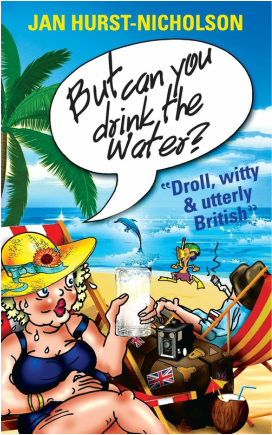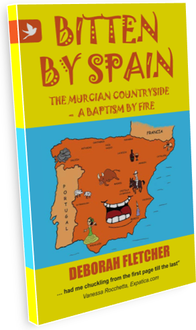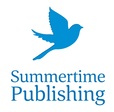Deborah Fletcher on Deborah Fletcher Tell me about your book. What is it about? Can you describe it in just a few sentences? To show that a book has focus it is vital that it can be described briefly and succinctly.
My book is a set of my observations of the mountain valley that is my home in southern Spain and the elements therein that are, basically, hostile to these arrogant foreign upstarts that think they are equipped to deal with its savagery. Also of the neighbours and general townsfolk here who consistently generate misunderstandings, difficulties, hilarity and consternation far too entertaining to consign unrecorded to the past. Why did you write it? It was cathartic. I had the option either to a) stand on the edge of the valley naked and scream like a banshee, or b) spew into a keyboard to share the unbelievable with the sceptical. Basically, it was too cold for nudity when the decision was made. Why do you think your book needed to be written? What will your book do for other people? It came into being initially after I had sent out the first four chapters or so in piecemeal form as emails to friends and family to let them know that I was still floating and able to draw air. The clamour for more, whilst surprising, made me realise that there are a whole bunch of vicarious masochists out there who positively wallowed in my various and ongoing challenges. I’d like to think that it would, in some small way, help to prepare others who may care to take the same sort of path as ours. Or persuade them to think again. Who do you think will read your book? What made you think that there was a market for it? If your book has been out for a while, what proof do you have that you were right? Primarily I would expect it to be read by UK expats in Spain, or aspiring expats. And armchair travellers. I have had two years’ worth of steady royalties from sales on amazon which indicates that there is a smattering of people out there who will buy anything in this genre! It does not matter how good a book is, or how good your writing is if no one knows about it. What steps have you taken or do you plan to take to promote your book? Are you a speaker or trainer? Do you have a blog? A website? A newsletter? Do you use Facebook, Twitter or other social media tools? What about press releases and sending out review copies and free articles? Have you had any other ideas? Which methods do you think work best and can you give me any examples? At the outset I was asked by the publisher to join various social and business networking sites – I obliged with presence on Facebook, Twitter, Ecademy, LinkedIn. I regret to say that I enjoyed none of these, really, since I am socially impatient (and lazy). I was interviewed by a local TV station (Moratalla TV) and by a Málaga radio station. I sent books to press offices of English-speaking newspapers in Spain for review; also to various e-news networks here (Eye on Spain, Simply Networking, Expat Spain). All reviews have been gratifyingly good. As far as I know, I have not sold a book as a result of this. Something I haven’t done, and should, because I’d probably like to anyway, is blog. How did you publish your book? Did you find an agent, a publisher or did you publish it yourself? Please describe your process and tell us how you found the experience. I self-published at the outset under the title Spiders and Wine. This was a costly procedure, and of necessity resulted in a shorter book than I would otherwise have liked since costs increased with the number of pages. It also meant that I was entirely alone with the cover design, title, proof-reading, content and structure. It wasn’t a difficult process but it did leave me feeling very vulnerable! I did manage to sell directly (and give away) around 150 books, which left me just short of break-even. Then NativeSpain offered to re-issue the book under a different title and cover, and with a further 10,000-odd words of increased content. This happened surprisingly quickly; this time the title and the cover were chosen for me, and proof-reading was carried out by the publishers. Unfortunately, I also had to lose the pictures that were in Spiders and Wine, which felt to me like an amputation. I still feel that there is room for improvement… Self-belief can be a big problem for writers. How did you manage to stay confident in your ability and remember that you were good enough to write your book? How did you cope with the days when you thought you could not do it and that it was rubbish? That would be down to a hardened group of loyal fans including my husband John and close friends, who would flatten me like a ton of bricks if I dared to doubt. Also (and this will sound horribly self-satisfied) I would read again what I had written and enjoy it. It’s easy to procrastinate, to blame writers’ block and to put off finishing your project. How did you keep yourself motivated? And how long did it take you to write it? What was your routine? I have to say that it was never an issue. There is such a wealth of material around me, because the whole thing is so personal, that I was always inspired to “jot”. At the time, I was living in a static caravan with little else to do – it was my own self-made entertainment! Editing and re-writing (endlessly!) took a little longer, but I honestly think that could have gone on forever without some sort of deadline. It wasn’t a chore. I wrote while most people watch TV (which I never do, incidently). What was your biggest challenge regarding the writing of your book? How have you overcome that? Trying to gather the individual experiences into coherent groupings, rather than ramble. Keeping the underlying thread of the house-building problem running without letting it darken the general mood of the book. Finishing off adequately when in fact it doesn’t end. Did I overcome any of these challenges? Quite possibly not! If you were to give advice to someone else who is thinking about writing a book, what would be your number one tip? Only consider it if you are prepared to be very, very antisocial during its execution. Did your teacher, parent or friends used to get angry with you staring out of the window all the time? Did they accuse you of being ‘away with the fairies’?
Good news! Daydreaming is a good thing if you are a writer. At least, it has done me no harm. To find out more, please read my January column at The Hague Online, where I am Writer in Residence.  Tell me about yourself I’ve been been writing (with moderate success) for about 25 years. I was born in the UK, but left to live in South Africa in the 1970s. My experiences (and those of fellow expats) of moving to a new continent were the inspiration for But Can You Drink The Water? On arrival in South Africa I worked in the R&D department of a large Durban bakery and this gave me the idea for The Breadwinners, a family saga based on an immigrant Scottish baker. I am a member of the South African Writers’ Circle, and of SpeakOut, an organization that teaches public speaking (for when I become a famous writer!). I live in Durban with my husband, two dogs that are forever on the wrong side of the door, and three cats that like to snooze on my work, thus providing the excuse to stop writing that every writer craves. Tell me about your book. What is it about? Can you describe it in just a few sentences? Set in 1988, the book is a humorous portrayal of a naive working-class family’s attempts to fit in after emigrating from Liverpool to apartheid SA. It uses subtle observational humour, with an underlying pathos, to portray the upsets, hurt and changing family dynamics that emigration brings. Why did you write it? It began as a sitcom, but when that came to naught I turned the script into a novel because this wonderful cast of characters had become part of my life. Although the novel was runner-up in a humorous UK novel competition it failed to find a publisher, so I adapted three of the chapters into short stories and these were published in local and overseas magazines, and one was read out on BBC radio Merseyside. In January 2010 I dusted off the novel once again and entered it in the 2010 Amazon Breakthrough Novel Award. It made it to the semi-finals (top 50 out of 5000) and this inspired me to publish the book as a Kindle e-book. Why do you think needed to be written? What will your book do for other people? It needed to be written because the characters were in my head desperate to get out and tell their story, and I didn’t want my head to explode. I hope the book will make readers laugh, perhaps from recognition of the characters and situations, or even from self-recognition. And you never know – it might even prove helpful for prospective expats and their families. Who do you think will read your book? What made you think that there was a market for it? Now that it’s been out for a while, what proof do you have that you were right? The book should appeal to anyone who enjoys British humour of the Educating Rita and Shirley Valentine type, but especially to the 1000s of expats and families of expats who’ve had similar experiences to the Turner family. The book has only been on sale for a couple of months, but the sales are increasing steadily, especially on Amazon.co.uk, and the reviews so far have been good. It does not matter how good a book is, or how good your writing is if no one knows about it. What steps have you taken or do you plan to take to promote your book? Are you a speaker or trainer? Do you have a blog? A website? A newsletter? Do you use Facebook, Twitter or other social media tools? What about press releases and sending out review copies and free articles? Have you had any other ideas? Which methods do you think work best and can you give me any examples? I have given many talks to various organizations and schools about my print books, and these usually result in good sales, but not having a print version of the book will obviously make this form of advertising a little difficult until more South Africans own e-reader devices. I have a website just4kix.jimdo.com. I am on Twitter and Facebook. I post on several forums on various websites connected to writing and reading, and have made some useful contacts. I have offered review copies to websites that review books, and am also listed on many writing blogs and websites. Taking part in forum threads on Amazon, Kindleboards, Mobibooks, Authonomy etc. has worked for me because of the huge amount of information and shared experiences posted there. It was a forum post that led me to the ABNA competition. Through the Amazon ABNA thread I made contact with a marketing lady in the US who kindly featured me on her website, and from her I also learned about the Indie Spotlight and was a featured author there. It was the ABNA competition that led me to publishing my books as e-books, and it has been the forums where I have found review websites, readers, and marketing advice. How did you publish your book? What was your route to publication? My children’s books were published by traditional mainstream publishers, but I self-published (with the help of the Writers’ Circle Publishing) Something to Read on the Plane, a compilation of my previously published humorous articles and short stories. Print books are expensive to publish, so when I saw the opportunity to publish an e-book at no cost I realized I had nothing to lose, and if sales are good the book might even be picked up by a traditional publisher. Self-belief can be a big problem for writers. How did you manage to stay confident in your ability and remember that you were good enough to write your book? How did you cope with the days when you thought you could not do it and that it was rubbish? The book was written in 1988 so has gone through many years of rejections and being put away in the back of a drawer, but each time I hauled it out I made revisions based on my improved writing skills. The reviews from the ABNA competition made me realize that the book did have merit and could be enjoyed by readers. It’s easy to procrastinate, to blame writers’ block and to put off finishing your project. How did you keep yourself motivated? And how long did it take you to write it? What was your routine? I was motivated to write the original sitcom scripts because a producer was interested in them and they were fun to do. When I began on the novel I already had the groundwork done so that made it a little easier to continue, but I’m a dreadful fidget and am always popping up and down, mostly to let dogs and cats in and out (and I do believe fidgeting keeps you slim!) I think it took me about 18 months to complete, including research. I did most of my writing in the mornings. Computers were very much in the early stages. I can even remember when cutting and pasting literally did mean cutting up the paragraphs on the typed sheet and re-arranging them on the desk in a more pleasing/readable order. What was your biggest challenge regarding the writing of your book? How have you overcome that? Writing isn’t the challenge – getting an agent or publisher interested in your book is the main bugbear of most fiction writers! I overcame that by publishing it myself. I believe that getting feedback is really important to help you recognise when your writing is really good and to find ways of making it even better. How did you get feedback on your work? I attended writers’ workshops and they were helpful (at least with humour if someone laughs you know your writing is working). I had done a writing course a few years before beginning the novel and I read lots of books and magazines on writing. I have also submitted to a few critique groups on the web. I think it is important to read published books in the genre you are writing in so you can see what does, and what doesn’t work. Humour is often based on a shared background, so you have to be aware that not everyone will appreciate or understand your humour. If you were to give advice to someone else who is thinking about writing a book based on their life experience what would be your number one tip? I think a tip for every writer is to listen carefully to constructive criticism and don’t be too ‘precious’ about your work. Consider advice carefully before deciding to accept or reject it. A good maxim is: If one person tells you you’re drunk you can consider it just one person’s opinion. If two people tell you you’re drunk you should think about it. If three people tell you you’re drunk you should go and lie down. Develop a thick skin to deal with rejections (especially if you’re writing fiction). |
�
All the latest news from the team at Summertime Publishing
As an Amazon Associate, we may earn a commission from qualifying purchases. This does not affect the price you pay or your consumer rights.
Archives
June 2024
|


